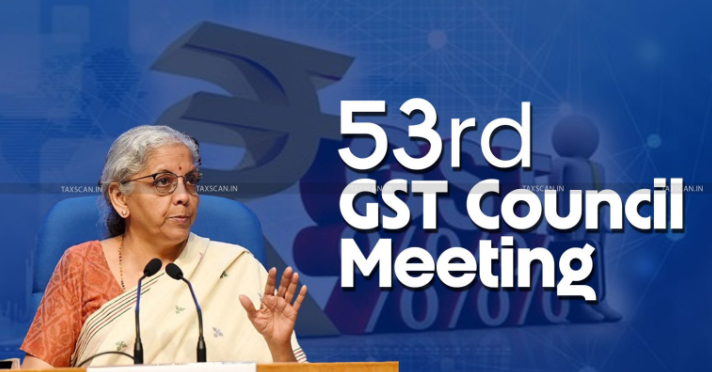53rd GST Council Meeting (GS Paper 2, Government Policies)

Introduction
- The 53rd meeting of the Goods and Services Tax (GST) Council, held on June 25, 2024, approved several measures aimed at easing compliance for small businesses and introduced various exemptions and reductions in GST rates.
- The Council also announced plans to reconvene in August 2024 to discuss restructuring the multiple tax rates under the seven-year-old GST system.
Key Highlights of the 53rd GST Council Meeting
Aadhaar-based Biometric Authentication:
- The Council approved the nationwide rollout of biometric-based Aadhaar authentication to combat fraudulent input tax credit claims made through fake invoices.
- This measure is intended to enhance tax compliance and reduce fraud.
Exemption for Hostel Accommodation:
- Hostel accommodation services outside educational institutions are now exempt from GST for rents up to Rs 20,000 per person per month.
- This exemption, previously subject to 12% GST, applies to stays up to 90 days, making accommodation more affordable for students and the working class.
Indian Railways Services:
- Platform tickets for Indian Railways are now exempt from GST, easing the financial burden on passengers.
- This decision is part of broader efforts to make railway services more affordable.
Reduction in GST Rate on Cartons:
- The GST rate on various types of carton boxes has been reduced from 18% to 12%.
- This change aims to benefit both manufacturers and consumers by lowering the overall cost of essential packaging materials.
GST Reduction on Milk Cans and Solar Cookers:
- A uniform GST rate of 12% has been announced for all milk cans, regardless of whether they are made of steel, iron, or aluminium. This uniformity simplifies the tax structure for these items.
Waiver of Interest and Penalties for Non-Fraudulent Cases:
- The Council recommended waiving interest and penalties for demand notices issued under Section 73 of the GST Act, which applies to cases not involving fraud, suppression, or misstatements. This aims to provide relief to businesses facing genuine compliance issues.
New Monetary Limits for Filing Appeals:
- The Council has set new monetary thresholds for filing appeals by the department: Rs 20 lakh for the GST Appellate Tribunal, Rs 1 crore for High Court, and Rs 2 crore for the Supreme Court. This is expected to reduce government litigation.
Central Support and Conditional Loans to States:
- The government introduced the 'Scheme for Special Assistance to States for Capital Investment', with some loans conditional on states implementing citizen-centric reforms and capital projects. This incentivizes states to meet the criteria to access these loans.
Petrol and Diesel under GST:
- The central government expressed its intent to bring petrol and diesel under the GST regime, pending consensus among states on the applicable tax rate. This move aims at uniform taxation of fuel across the country.
Overview of the GST Council
About:
- The GST Council is a constitutional body responsible for making recommendations on issues related to the implementation of GST in India.
- It was established to simplify the tax structure, making it more uniform across the country.
Constitutional Provisions:
- The 101st Amendment Act of 2016 introduced GST in India and inserted Article 279-A in the Constitution, empowering the President to constitute the GST Council.
Members:
- The Council includes the Union Finance Minister (Chairperson), the Union Minister of State (Finance), and state-nominated ministers in charge of finance or taxation.
Functions:
- The Council makes recommendations on GST-related issues such as tax exemptions, model GST laws, and GST rates.
- It also decides on rate slabs and special rates for raising additional resources during natural calamities or for specific states.
Working:
- Decisions are made by a majority of at least three-fourths of the weighted votes of the members present and voting.
- The Central Government's vote has a weightage of one-third, while the votes of all state governments combined have a weightage of two-thirds.
- A quorum of 50% of the total members is required to conduct a meeting.
Binding Nature:
- Initially considered binding, the recommendations of the GST Council are now deemed non-binding following the 2022 Supreme Court ruling in Union of India v. Mohit Minerals Pvt. Ltd, which established that both Parliament and State legislatures have "simultaneous" power to legislate on GST.
Conclusion
- The 53rd GST Council meeting introduced significant measures to simplify compliance and reduce the tax burden on various sectors.
- These decisions reflect the Council's ongoing efforts to refine the GST framework, enhance compliance, and support economic growth.
- The upcoming discussions on restructuring GST rates will further shape the future of India's tax system.


